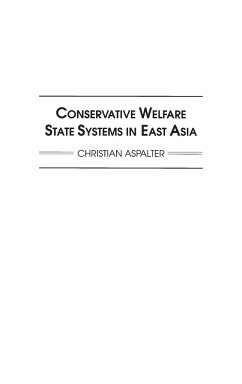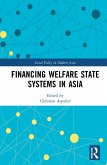Aspalter examines the historical, political, and social backdrops to the social welfare systems in the most developed welfare state systems of East Asia: Japan, South Korea, Taiwan, Singapore, Hong Kong, and the People's Republic of China. He applies a political approach to examine the causal determinants of welfare state development, such as: historical factors; political systems; party systems; party politics; the politics of legitimization; the impact of constitutions; state structures; electrons; social movements
Aspalter provides six country studies of the most developed welfare state systems in East Asia-Japan, South Korea, Taiwan, Singapore, Hong Kong, and the People's Republic of China. He applies a political approach to examine the causal determinants of welfare state development, such as: .historical factors .political systems .party systems .the politics of legitimization .the impact of constitutions .state structures .elections .social movements A common trend in East Asian welfare state politics appears throughout this approach, and Aspalter shows that the welfare state is being extended, not reduced, as is the case in many areas affected by economic globalization. He concludes that social insurance systems are, for the most part, divided into occupational classes. Also, social assistance is highly stigmatized, and, for the most part, guaranteed after means tests. Most importantly, the State shows a strong disapproval of government-financed social welfare policies. This provocative analysis will be of particular interest to scholars, students, and other researchers involved with East Asia and comparative social welfare systems.
Hinweis: Dieser Artikel kann nur an eine deutsche Lieferadresse ausgeliefert werden.
Aspalter provides six country studies of the most developed welfare state systems in East Asia-Japan, South Korea, Taiwan, Singapore, Hong Kong, and the People's Republic of China. He applies a political approach to examine the causal determinants of welfare state development, such as: .historical factors .political systems .party systems .the politics of legitimization .the impact of constitutions .state structures .elections .social movements A common trend in East Asian welfare state politics appears throughout this approach, and Aspalter shows that the welfare state is being extended, not reduced, as is the case in many areas affected by economic globalization. He concludes that social insurance systems are, for the most part, divided into occupational classes. Also, social assistance is highly stigmatized, and, for the most part, guaranteed after means tests. Most importantly, the State shows a strong disapproval of government-financed social welfare policies. This provocative analysis will be of particular interest to scholars, students, and other researchers involved with East Asia and comparative social welfare systems.
Hinweis: Dieser Artikel kann nur an eine deutsche Lieferadresse ausgeliefert werden.








